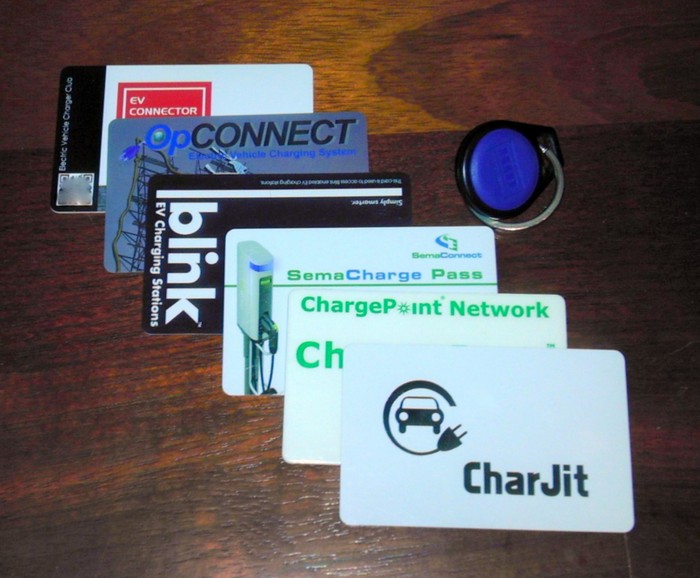One challenge to more widespread adoption of electric cars is public charging--or rather, the scattered multiple networks of irregularly spaced public charging stations.
In Japan, the four major electric-car makers have now joined together to form a new company whose goal is to build a single public charging network, with an access card that will work throughout Japan and "offers more convenience to drivers."
DON'T MISS: Nissan EZ Charge Card To Let Leafs Recharge On Four Networks
Announced this morning, Nippon Charge Service LLC is being supported by Honda, Mitsubishi, Nissan, and Toyota.

Nippon Charging Services, explanatory diagram from launch presentation, May 2014
Single access card
By the end of the year, all four carmakers will provide electric-car drivers with a single, universally-accepted charging card that can be used at all locations operated by the new company.
Nippon Charge Service's intent, according to a release, is to promote installation of plug-in electric vehicle charging stations and foster "broader acceptance of electric vehicles by building a user-friendly infrastructure that will help society maximize the possibilities of electric vehicles."
Followup to funding
The new company follows a November 2013 announcement that the four automakers would offer financial assistance to entities wishing to install public charging stations. That assistance, together with subsidies from the Japanese government, covers the full cost of installation.
Enterprises--whether private, commercial, corporate, or public--that are installing charging stations under that program will be asked to participate in the access network being run by Nippon Charge Services.
The new company will focus on charging stations at locations "recognized to have high public value" under plans drawn up by local authorities and government bodies for public charging infrastructure.
Those include fueling and service stations and parking areas on both highways and regular roads, hotels and motels, and large commercial facilities.
Installation of charging sites funded by last fall's program is already underway at hotels, highway rest stops, convenience stores, and various commercial sites. The new universal charging system will tie those sites and many more together into a single network.

EZ-Charge program logo
Could we do it too?
The 100,000-plus U.S. drivers of plug-in electric cars have long complained about the scattered nature of charging networks--requiring them to carry up to seven different access cards or fobs to use stations in their area.
Could such a network happen in the U.S.?
It's conceivable, but it would require cooperation not only among the carmakers of one country--Japan's automakers often work together on projects that will benefit all of them, under the firm direction of government ministries--but among Japanese, U.S., and German carmakers.
ALSO SEE: EZ-Charge Program Not So Easy As ChargePoint Exits Nissan Plan
More than that, the present network of charging stations in the U.S. has been funded by Federal, state, local, private, corporate, and nonprofit sources, meaning there are hundreds if not thousands of individual circumstances among the 10,000-plus charging locations today.
Given the difficulties faced by Nissan and its four charging-network partners--now down to three, at least for the moment--in setting up the proposed EZ-Charge access card, it will require a lot of hard work and compromise.

Electric-car charging network cards, photo by Patrick Connor, Portland
Just like cell phones
(Tesla Motors, as always, would likely go its own way, with its fast-growing proprietary network of Supercharger fast-charging locations usable only by owners of Tesla Model S cars and future models.)
The challenge is similar to that faced by cellular telephone companies in the early days of the 1990s, when roaming arrangements had to be set up among hundreds of little mobile-phone companies.
Ultimately, that happened--today the U.S. has two large and two small mobile-phone providers, and nationwide roaming--but it took a ferocious amount of bare-knuckle contract negotiations and then back-office work to make it happen.
Funding for Nippon Charge Services will come both from the four automakers and from Development Bank of Japan, through its Fund for Japanese Industrial Competitiveness.
_______________________________________________













